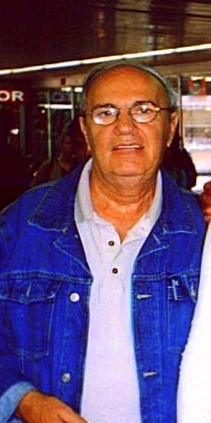Herman Rosenblat
| Herman Rosenblat | |
|---|---|

Herman Rosenblat
|
|
| Born |
c. 1929 Poland |
| Died | February 5, 2015 (aged 85–86) Florida, United States |
| Residence | Miami, Florida |
| Spouse(s) | Roma |
Herman A. Rosenblat (c. 1929 – February 5, 2015) was a Polish-born American writer who wrote a fictitious Holocaust memoir titled Angel at the Fence, purporting to tell the true story of a girl who passed him food through the barbed-wire fence at the Schlieben sub-camp of the Buchenwald concentration camp in World War II. The book was planned to be published in 2009 by Berkely Books, but was cancelled after it turned out that many elements of his memoir were fabricated and some were contrary to verifiable historical facts. Rosenblat later admitted to lying on purpose with the intention of bringing joy.
Before the fabrication became public, the film rights to the book were purchased for $25 million by Harris Salomon of Atlantic Overseas Pictures. Other fans of the story include Oprah Winfrey who has described it as the single greatest love story she heard in over 22 years of hosting her show.
The story behind the Rosenblat's story is being developed as an independent feature film. In June 2010 Atlantic Overseas Pictures and producer Harris Salomon signed a co-production agreement with Castel Film Studios, a well known studio in Central and Eastern Europe and the studio for Cold Mountain and Borat as well as 3rd-i films in London, to produce a feature film about the Herman Rosenblat affair based on an original screenplay by award-winning screenwriter Ivo Marloh entitled The Apple, scheduled for production in 2015.
Rosenblat, a Polish Jew, lived in the town of Piotrków Trybunalski before World War II. Following the invasion of Poland, the Nazis rounded up his family in 1939 along with thousands of others when the Piotrków Trybunalski Ghetto was set up. His father had previously died of typhus. Two years later, when Rosenblat was 12 years old, his mother was separated from him and put on a Holocaust train to Treblinka extermination camp during one of the ghetto liquidation actions. About 90% of the inhabitants of the ghetto were sent to Majdanek and Treblinka death camps. He later wrote that he lied to the Germans about his age because the Nazis used older boys for slave labor, and sent younger ones for extermination. In July 1944, with the front lines approaching, he was deported with his three older brothers to Schlieben sub-camp of the Buchenwald concentration camp, until February 1945. He claimed in his memoir that his future wife Roma, a nine-year-old Jewish girl hiding in the town of Schlieben with her family, threw him apples and bread over the electrified, guarded fence of the camp on a daily basis throughout the seven months' period.
...
Wikipedia
